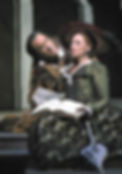top of page
CONTACT
CONTACT
CONTACT
CONTACT


CRITICAL
ACCLAIM
10/22/24
As Prince Gremin, Eugene Onegin
"This star-studded show featured Richard Bernstein, a 29-year member of the Metropolitan Opera Company. He performed the role of the Bonze, Cio Cio San's uncle in the Met's production of "Madame Butterfly." Bernstein reprised this role for Saturday night's Divaria production, and his rich bass voice resonating across the stage was one of the show's highlights."
— Cindi Sansone-Braff, Southampton Patch
As the Bonze, Madama Butterfly

7/30/15
As Prince Gremin, Eugene Onegin
“Bass Richard Bernstein, always a joy when he comes our way, was thrilling...His voice is powerful and established him as a heroic, rather than in any way a pathetic figure.”
— Robert W. Plyler, Jamestown Post-Journal
8/3/15
“It is hard to find a bass who won’t jump at the role of Gremin, and Bernstein showed why with a stout and estimable performance of ‘Lyubvi vse vozrasti pokorni.'”
— Andrew Druckenbrod, Chautauqua Daily
As Gremin, Eugene Onegin

6/29/09
“One of America’s most versatile and gifted basses, Richard Bernstein… As the black-clad – and black-hearted – confessor Raimondo, he – Bible in hand – makes the corruption of the church palpable. And he does this with a composed reserve that moves the figure beyond caricature.”
— Wes Blomster, Daily Camera
6/29/09
“Bass Richard Bernstein…as the misguided chaplain, Raimondo…possesses an appealing bass-baritone voice with a big, resonant lower register that fits this role well.”
— Kyle MacMillan Denver Post

7/30/15
"Mr. Bernstein, whose singing was among the best in the production, also brought a welcome note of comic relief to an otherwise doom-filled scenario.”
— Tobias Grace, outinjersey.net
8/3/15
“Bass Richard Bernstein took charge of [his] role and the tension between [the] characters with clear vocal and dramatic strength clearly gained from years on opera’s major stages."
— Nancy Plum, towntopics.com
7/30/15
“The smaller roles were well cast, with the bass Richard Bernstein a firm-voiced Daland.”
— Zachary Wolfe, nytimes.com

2/09/05
The American Richard Bernstein, who sang with a sonorous tone and a never-ending comic verve, makes the role a daunting quasi-hero.”
— Caroline Alexander, Opéra/Classique
12/30/02
“The dynamic, robust-voiced bass-baritone Richard Bernstein brought more danger and volatility to the role of Leporello, the Don’s hapless servant.”
— Anthony Tommasini, The New York Times
08/01/01
"Leporello, as a part, is very sympathetic and when you have someone like Richard Bernstein doing it, Leporello becomes the audience’s favorite. With his strong, effortless bass he can also be extremely entertaining. The man is a born comedian and is responsible for the funniest scene in the opera."
— Riitta-Leena Lempinen, Itä-savo

4/03/01
"The man is born for the stage, and brings also on top of that a beautiful bass voice as well. A brilliant debut!”
— Beate Kayser, Tageszeitung
11/23/98
“The limber, athletic Mr. Bernstein has a robust and virile voice, with an especially rich lower range. The essentially plush character of his voice never faltered.”
— Anthony Tommasini, The New York Times
11/12/99
“As Figaro, bass Richard Bernstein gives a consummate portrayal, channeling his character’s lighthearted and mercurial emotions with every inch of his body. His singing, meanwhile, is deliciously placed – as round and handsome as it is technically strong.”
— Mark H. Beers, Philadelphia Weekly

9/11/98
“As the flamboyant Escamillo, Richard Bernstein was every inch the self-assured, sexually confident bullfighter. He sang with not only resonance but a touch of humor, a sense of the power of his personality and a sense that it fit him well.”
— John Farrell, Pasadena Star-News
11/22/96
“The singer who simply takes charge of the stage is Richard Bernstein. Not every bass knows how to seize the moments. Bernstein does that, and more; he has us hanging on his every note and flamenco flourish and at his every appearance.”
— Barbara Zuck, The Columbus Dispatch
12/12/98
“Richard Bernstein was an Escamillo in the grand style whose appearance exhibited an exciting profusion of vocal dynamism.”
— Jacques Fournier, Opéra International
As Daland, Der Fliegende Holländer
As Raimondo, Lucia di Lammermoor
As Leporello, Don Giovanni
As Figaro, Le nozze di Figaro
As Escamillo, Carmen
bottom of page